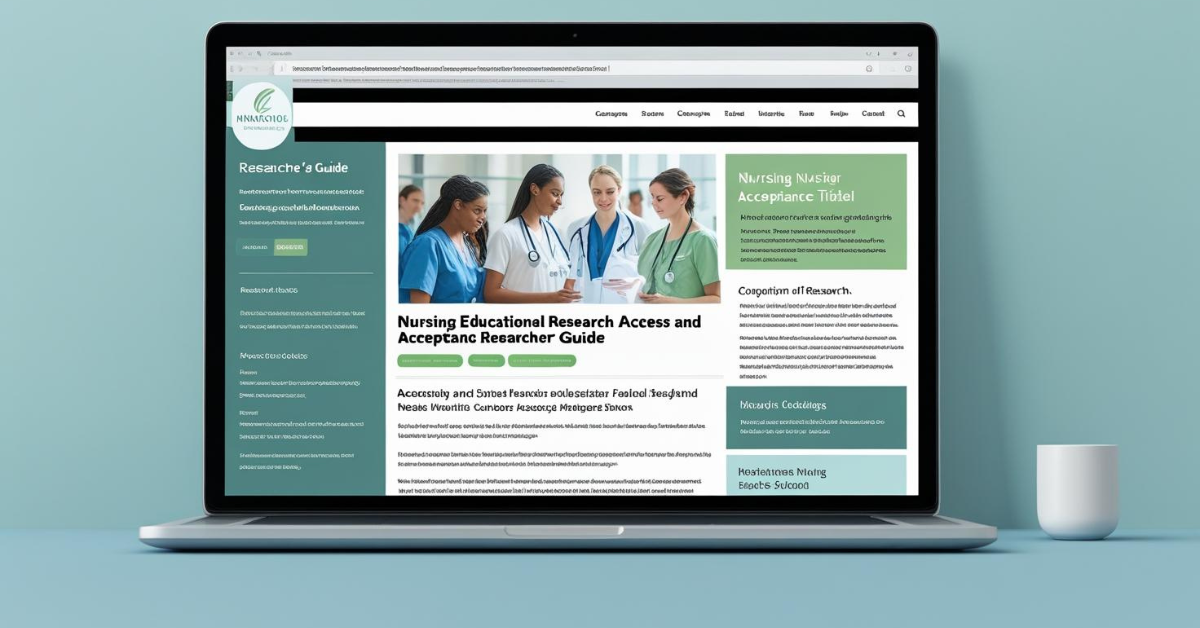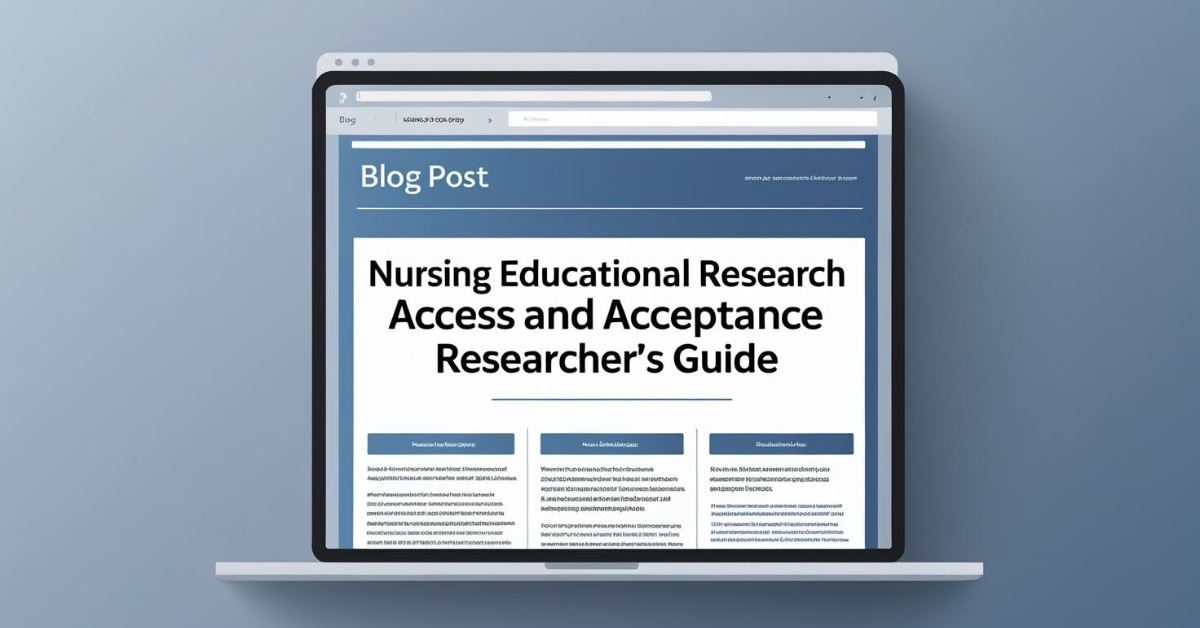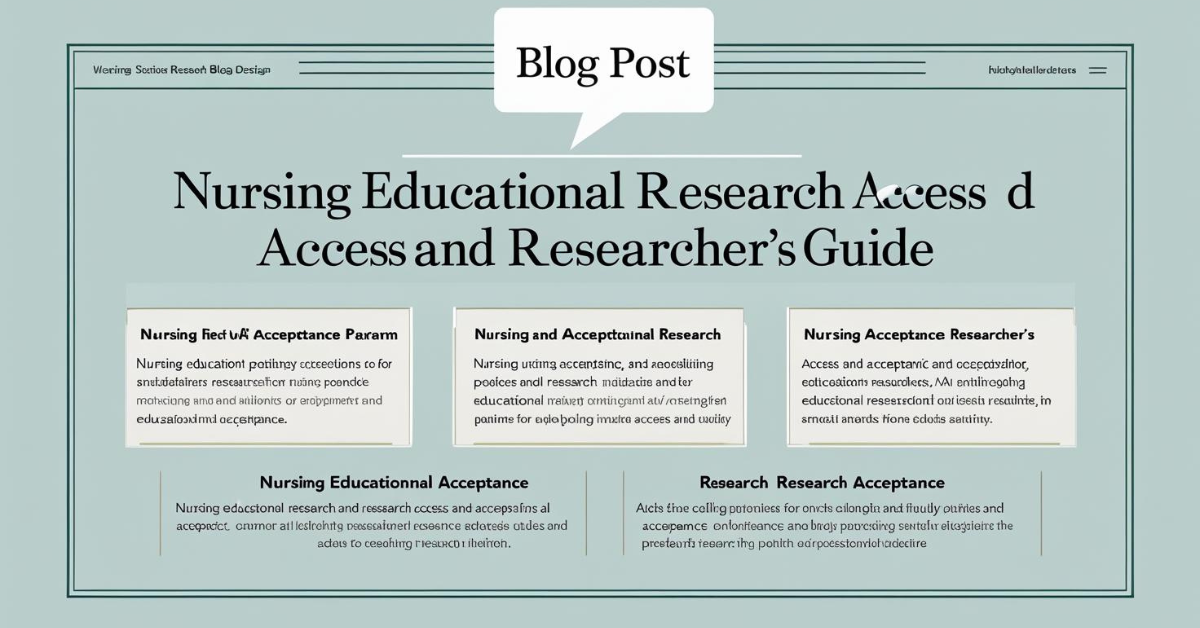What is Nursing Educational Research Access and Acceptance Researcher’s Guide. A comprehensive “Researcher’s Guide to Access and Acceptability of Nursing Education Research” focuses on research ethics, methodological rigor, data access, and privacy.
The Nursing Educational Research Access and Acceptance Researcher’s Guide
Important elements include understanding the principles of informed consent, beneficence, and equity to protect participants, especially students; using validated methods to ensure reliable results; and obtaining ethical approval from Institutional Review Boards (IRBs) or similar committees. A researcher’s guide should also consider the specific challenges of education research and the importance of building trust and establishing partnerships with institutions and participants.
Introduction to Why Access and Acceptance Matter
The relevance of the principle of informed con sent becomes apparent at the initial stage of the research project that of access to the institution or organization where the research is to be conducted, and acceptance by those who’s per mission one needs before embarking on the task.
Building Your Research Reputation
We highlight this stage of access and acceptance in particular at this point because it offers the best opportunity for researchers to present their credentials as serious investigators and establish their own ethical position with respect to their proposed research.
Foundation of Ethical Research
Investigators cannot expect access to a nursery, school, college, or factory as a matter of right. They have to demonstrate that they are worthy, as researchers and human beings, of being accorded the facilities needed to carry out their investigations.
Step-by-Step Approach to Gaining Access
Start with Solid Preparation
The advice of Bell (1987) is particularly apposite in this connection: Permission to carry out an investigation must always be sought at an early stage. As soon as you have an agreed project outline and have read enough to convince yourself that the topic is feasible, it is advisable to make a formal, written approach to the individuals and organization concerned, outlining your plans. Be honest.
If you are carrying out an investigation in connection with a diploma or degree course, say that is what you are doing. If you feel the study will probably yield useful and/or interesting information, make a particular point of that fact—but be careful not to claim more than the investigation merits. (Bell, 1987:42) The first stage thus involves the gaining of official permission to undertake one’s research in the target community.
Identify the Right People
This will mean contacting, in person or in writing, an LEA official and/ or the chairperson of the governors, if one is to work in a school, along with the head teacher or principal. At a later point, significant figures who will be responsible for, or assist in, the organization and administration of the research will also need to be contacted the deputy head or senior teacher, for instance, and most certainly the class teacher if children are to be used in the research.
Since the researcher’s potential for intrusion and perhaps disruption is considerable, amicable relations with the class teacher in particular should be fostered as expeditiously as possible. If the investigation involves teachers as participants, propositions may have to be put to a full staff meeting and conditions negotiated. Where the research is to take place in another kind of institution—a youth club or detention center, for example the principle of approach will be similar, although the organizational structure will be different.
Building Relationships and Trust
The Importance of Goodwill
Achieving goodwill and co-operation is especially important where the proposed research extends over a period of time: days, perhaps, in the case of an ethnographic study; months (or perhaps years!) where longitudinal research is involved.
Don’t Assume Cooperation
Access does not present quite such a problem when, for example, a one-off survey requires respondents to give up half-an-hour of their time; or when a researcher is normally a member of the organization where the research is taking place (an insider), though in the case of the latter, it is generally unwise to take cooperation for granted. Where research procedures are extensive and complicated, however, or where the design is developmental or longitudinal, or where researchers are not normally based in the target community, the problems of access are more involved and require greater preparation.
Having identified the official and significant figures whose permission must be sought, and before actually meeting them, researchers will need to clarify in their own minds the precise nature and scope of their research.
In this respect researchers could, for instance, identify the aims of the research; its practical applications, if any; the design, methods and procedures to be used; the nature and size of samples or groups; what tests are to be administered and how; what activities are to be observed; what subjects are to be interviewed; observational needs; the time involved; the degree of disruption envisaged; arrangements to guarantee confidentiality with respect to data (if this is necessary); the role of feedback and how findings can best be disseminated; the overall timetable within which the research is to be encompassed; and finally, whether assistance will be required in the organization and administration of the research.
By such planning and foresight, both researchers and institutions will have a good idea of the demands likely to be made on both subjects (be they children or teachers) and organizations. It is also a good opportunity to anticipate and resolve likely problems, especially those of a practical kind. A long, complicated questionnaire, for example, may place undue demands on the comprehension skills and attention spans of a particular class of 13-year-olds; or a relatively inexperienced teacher could feel threatened by sustained research scrutiny.
Once this kind of information has been sorted out and clarified, researchers will be in a strong position to discuss their proposed plans in an informed, open and frank manner (though not necessarily too open, as we shall see) and will thereby more readily gain permission, acceptance, and support. It must be remembered that hosts will have perceptions of researchers and their intentions and that these need to be positive.
Researchers can best influence such perceptions by presenting themselves as competent, trustworthy, and accommodating. Once this preliminary information has been collected, researchers are duly prepared for the next stage: making actual contact in per son, perhaps after an introductory letter, with appropriate people in the organization with a view to negotiating access. If the research is college-based, they will have the support of their college and course supervisors.
Go to the Top First
Festinger and Katz (1966) consider that there is real economy in going to the very top of the organization or system in question to obtain as sent and cooperation. This is particularly so where the structure is clearly hierarchical and where lower levels are always dependent on their superiors.
They consider that it is likely that the nature of the research will be referred to the top of the organization sooner or later, and that there is a much better chance for a favorable decision if leaders are consulted at the outset. It may also be the case that heads will be more open-minded than those lower down, who because of their insecurity, may be less co-operative.
Common Pitfalls to Avoid
Don’t Take the Easy Route
The authors also warn against using the easiest entrances into the organization when seeking permission. Re searchers may perhaps seek to come in as allies of individuals or groups who have a special interest to exploit and who see research as a means to their ends. As Festinger and Katz put it, ‘The researcher’s aim should be to enter the situation in the common interests of all par ties, and his findings should be equally available to all groups and individuals’ (Festinger and Katz, 1966).
Investigators should thus seek as broad a basis for their support as possible. Other potential problems may be circumvented by making use of accepted channels of communication in the institution or organization. In a school, for example, this may take the form of a staff forum. As Festinger and Katz say in this regard, ‘If the information is limited to a single channel, the study may become identified with the interests associated with that channel’ (Festinger and Katz, 1966).
Navigating the Negotiation Process
The Art of Strategic Disclosure
Following contact, there will be a negotiation process. At this point researchers will give as much information about the aims, nature and procedures of the research as is appropriate. This is very important: information that may prejudice the results of the investigation should be withheld. Aronson and Carlsmith (1969), for instance, note that one cannot imagine researchers who are studying the effects of group pressure on conformity announcing their intentions in advance.
On the other hand, researchers may find themselves on dangerous ground if they go to the extreme of maintaining a ‘conspiracy of silence’, because, as Festinger and Katz note, such a stance is hard to keep up if the research is extensive and lasts over several days or weeks. As they say in this respect, ‘An attempt to preserve secrecy merely increases the spread and wildness of the rumours’ (Festinger and Katz, 1966).
Finding the Middle Ground
If researchers do not want their potential hosts and/or subjects to know too much about specific hypotheses and objectives, then a simple way out is to present an explicit statement at a fairly general level with one or two examples of items that are not crucial to the study as a whole.
As most research entails some risks, especially where field studies are concerned, and as the presence of an observer scrutinizing various aspects of community or school life may not be relished by all in the group, investigators must at all times manifest a sensitive appreciation of their hosts’ and subjects’ position and reassure anyone who feels threatened by the work. Such reassurance could take the form of a statement of conditions and guarantees given by researchers at this negotiation stage.
Ethical Foundation
We conclude this section by reminding beginning researchers in particular that there will be times when ethical considerations will pervade much of their work and that these will be no more so than at the stage of access and acceptance, where appropriateness of topic, design, methods, guarantees of confidentiality, analysis and dissemination of findings must be negotiated with relative open ness, sensitivity, honesty, accuracy and scientific impartiality.
As we have indicated earlier, there can be no rigid rules in this context. It will be a case of formulating and abiding by one’s own situational ethics. These will determine what is acceptable and what is not acceptable. Hitchcock and Hughes (1989) say in this regard: Individual circumstances must be the final arbiter. As far as possible it is better if the teacher can discuss the research with all parties involved. On other occasions it may be better for the teacher to develop a pilot study and uncover some of the problems in advance of the research proper.
If it appears that the research is going to come into conflict with aspects of school policy, management styles, or individual personalities, it is better to confront the issues head on, consult relevant parties, and make rearrangements in the research de sign where possible or necessary. (Hitchcock and Hughes, 1989:198) Where a pilot study is not feasible it may be possible to arrange one or two scouting forays to assess possible problems and risks.
Read More:
https://nurseseducator.com/didactic-and-dialectic-teaching-rationale-for-team-based-learning/
https://nurseseducator.com/high-fidelity-simulation-use-in-nursing-education/
First NCLEX Exam Center In Pakistan From Lahore (Mall of Lahore) to the Global Nursing
Categories of Journals: W, X, Y and Z Category Journal In Nursing Education
AI in Healthcare Content Creation: A Double-Edged Sword and Scary
Social Links:
https://www.facebook.com/nurseseducator/
https://www.instagram.com/nurseseducator/
https://www.pinterest.com/NursesEducator/
https://www.linkedin.com/in/nurseseducator/
https://www.researchgate.net/profile/Afza-Lal-Din
https://scholar.google.com/citations?hl=en&user=F0XY9vQAAAAJ



Your writing has a way of making even the most complex topics accessible and engaging. I’m constantly impressed by your ability to distill complicated concepts into easy-to-understand language.
Envio mis saludos a todos los amantes de la adrenalina !
La experiencia en casino online fuera de espaГ±a se caracteriza por retiros sin comisiones y depГіsitos flexibles. Los usuarios destacan que casinos online fuera de espaГ±a permite apuestas en vivo con menor latencia. п»їcasino fuera de espaГ±a. En casino fuera de espaГ±a los usuarios encuentran juegos Гєnicos que no aparecen en sitios regulados.
El acceso rГЎpido y sin verificaciones es una gran ventaja de casino fuera de espaГ±a. La opciГіn de jugar en casinos online fuera de espaГ±a resulta atractiva para quienes valoran la privacidad. Gracias a casinosfueradeespana los jugadores pueden acceder a promociones especiales y giros gratis.
casino fuera de EspaГ±a con promociones Гєnicas – п»їhttps://casinosfueradeespana.blogspot.com/
Que disfrutes de increibles beneficios !
casinosfueradeespana.blogspot.com
Your blog is a true gem in the world of online content. I’m continually impressed by the depth of your research and the clarity of your writing. Thank you for sharing your wisdom with us.
Your blog is a breath of fresh air in the often mundane world of online content. Your unique perspective and engaging writing style never fail to leave a lasting impression. Thank you for sharing your insights with us.
Doy la bienvenida a todos los apostadores expertos !
Una gran ventaja de casinos sin verificacion es que puedes registrarte en segundos sin documentos. Algunos usuarios eligen casino sin verificaciГіn porque permite apuestas en vivo con baja latencia. casinos sin verificaciГіn. Los torneos con premios en cripto son frecuentes en casino sin verificaciГіn, atrayendo a muchos jugadores.
ВїBuscas privacidad total? Con casinos sin kyc puedes jugar sin dar datos personales. Una gran ventaja de casinosinverificacion.xyz es que puedes registrarte en segundos sin documentos. Las plataformas internacionales como crypto casino no kyc ofrecen bonos exclusivos sin necesidad de validaciГіn.
Los mejores bonos y ofertas en casinos sin kyc – https://casinosinverificacion.xyz/#
Espero que disfrutes de increibles victorias !
casinos sin verificaciГіn casinos sin kyc
Ecstasy hàng chuẩn đang hot, ai quan tâm thì click link này.